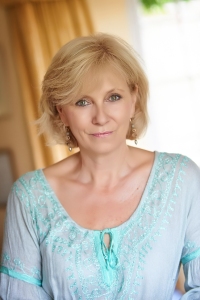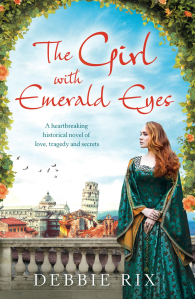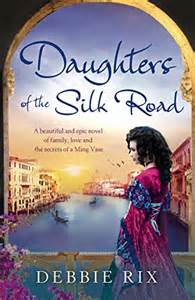Today in the Library we have Debbie Rix, who has dropped in to say hello and to share some insights into her life as an author.
You are very welcome to the library, Debbie, please introduce yourself:
 I’m a writer of historical fiction. My first book – ‘The Girl with Emerald Eyes’ – was published in March 2015. My second novel, set in fifteenth century Venice and the Low Countries, is called ‘Daughters of the Silk Road’ and came out this April. I’m married and have two kids, and we live in the country with cats and lots of chickens. I began my career at the BBC where I worked as a researcher before becoming the newsreader on BBC’s Breakfast Time. I then presented a variety of programmes including ‘Game for a Laugh’ and ‘FAX’ as well as numerous series on interior design. After my children were born, I worked behind the scenes producing big events for companies around the world. I also wrote a gardening column for a few years and was an Agony Aunt, which I loved. For the last thirteen years I have concentrated on producing events that raise money and the profile of UK charities, alongside writing fiction.
I’m a writer of historical fiction. My first book – ‘The Girl with Emerald Eyes’ – was published in March 2015. My second novel, set in fifteenth century Venice and the Low Countries, is called ‘Daughters of the Silk Road’ and came out this April. I’m married and have two kids, and we live in the country with cats and lots of chickens. I began my career at the BBC where I worked as a researcher before becoming the newsreader on BBC’s Breakfast Time. I then presented a variety of programmes including ‘Game for a Laugh’ and ‘FAX’ as well as numerous series on interior design. After my children were born, I worked behind the scenes producing big events for companies around the world. I also wrote a gardening column for a few years and was an Agony Aunt, which I loved. For the last thirteen years I have concentrated on producing events that raise money and the profile of UK charities, alongside writing fiction.
Did you read much as a child? Are you an avid reader now? Do you prefer books in your own genre or are you happy to explore others?
I really got into reading with ‘The Lion, The Witch and Wardrobe’ by C.S.Lewis. I quickly devoured the rest of the series. I adored the fantastic, otherworldy nature of the stories that was so at odds from my otherwise safe and secure suburban childhood. At eleven or twelve, I discovered ‘My family and Other animals’ by Gerald Durrell. I adored that book and re- read it constantly. I found their exotic existence living in a variety of beautiful villas in Corfu so seductive. The ‘children’ were all remarkable in their own way too – anarchic and complex. But oddly, the character that I most admired was the mother, who appeared completely unflappable in the face of all the adversity life, and her children, could throw at her. She coped with their friends and relations, their broken hearts and bizarre habits in the most extraordinarily stoical way, all the while cooking up vast banquets for the seeminlgy endless series of guests who came to stay in their houses. I hoped fervently that I would be as good a mother as her. As a teenager, I loved science fiction, but was pretty ominivorous in my tastes. I read the classics of course, and then quickly moved onto the contemporary classics – Edna O’Brien, Collette, Iris Murdoch, Graham Green. Oddly enough I am not an especial fan of historical fiction, even thought that is my current genre. I just like a really good story, well told. I enjoyed Robert Harris’s ‘An Officer and a Spy’ – a thrilling tale, exploring the facts around the Dreyfus Affair. I read a great deal for research purposes, but usually have a ‘relaxation’ book on the go. I read most voraciously on holiday. My idea of heaven is to be left alone to read and can usually get through a book in a day or two. I am pretty egalitarian in my tastes – I like funny books, thrillers, contemporary fiction.
Are you self-published or traditionally published?
I am published by Bookouture, who are relatively new on the scene and publish in ebook format or print on demand. They have grown rapidly in the last three years and now have over 30 authors in their stable, writing across a range of genres.
Which genre do you write in and why?
I write in the historical genre. I didn’t deliberately set out to be a writer of historical fiction, but I became fascinated by the untold story of a woman who had been overlooked by history. Her name was Berta di  Bernardo, and she left the money for the Tower of Pisa to be built. She lived in the 12th century, so I spent a lot of time researching the period, uncovering what I could of her life, meeting the Professor of Medieval History at Pisa University and so on. I discovered that I loved writing about the past – especially if it involves real people; I think it’s the journalist in me. I enjoy the discipline of setting a fictional tale within the bounds of reality and historical accuracy. It gives you a structure and often provides far more fascinating characters than you could ever make up. It’s a cliché I know but fact is so often more interesting that fiction!
Bernardo, and she left the money for the Tower of Pisa to be built. She lived in the 12th century, so I spent a lot of time researching the period, uncovering what I could of her life, meeting the Professor of Medieval History at Pisa University and so on. I discovered that I loved writing about the past – especially if it involves real people; I think it’s the journalist in me. I enjoy the discipline of setting a fictional tale within the bounds of reality and historical accuracy. It gives you a structure and often provides far more fascinating characters than you could ever make up. It’s a cliché I know but fact is so often more interesting that fiction!
Who has been the biggest influence on your writing?
In terms of other authors, I would have to say Olivia Manning. I read her wonderful Balkan Trilogy and Levant Trilogy (known collectively as The Fortunes Of War) many years before I began to write professionally; but I loved the way she was able to juxtapose an evocative and emotional human story with a grand sweeping narrative that took the reader on a journey through a fascinating period in the history. The other major influence is my own journalistic background, which has given me the desire and training to research a subject thoroughly. I also now realise that I have an interest in writing about real people that have been previously overlooked. My first novel was about a woman who history overlooked. My new novel also features a family who no one has ever heard of, in spite of the fact that the father was one of the first people to travel to China, and who wrote a fascinating diary about his experiences
Has your country of origin/culture influenced your writing?
I was brought up on the outskirts of Kent and London, near to David Bowie! I went to school in Dulwich, in south London and worked at the BBC as a young woman. As such my upbringing was pretty unremarkable. The only slightly unusual thing – at least in those days – was that my mother was an architect, alongside my father. Having two professional parents certainly gave me a perspective that was different from many of my friends and contemporaries.
What part of the writing process do you find most difficult? How do you overcome it?
The most challenging part is getting the story clear in my mind before I actually start to write. The initial idea comes quite quickly sometimes, but then, especially with historical fiction, you need to ensure that the story stacks up, is accurate, makes sense and so on. There is always the fear that you will uncover a piece of evidence that makes the story fall apart. I suppose that comes from my journalistic background. The only way to overcome it, is to do it… to research and read and make notes. Then to start to write and hope the story begins to unfold in the framework of reality that you have created.
Do you have a favourite time of day to write?
I work best between 9 and 1 pm. I have a bit of a dip after lunch but can usually work through it. I pick up again between 3 and 6. If I am really under pressure, I can work early in the morning, a habit I learnt when I had to get up at 3.30 to read the early morning news!
What is the best thing about being an author? And the flipside – what is the worst?
The best thing for me is simply knowing that I am finally published. I have wanted to write for so long, and have one or two unpublished novels in the backs of cupboards! But to finally find a publisher and see your book printed; to read the reviews of people who seem to have enjoyed it is a huge pleasure. Conversely the worse part is the dread that you will never again find a good story to tell!
Is social media an essential chore or something you enjoy? Which forum do you prefer?
I have to confess that I am not a huge social media fan. It does not come naturally to me – I suspect because I was not brought up with it. But I am learning. I was initially completely baffled by twitter, but I am beginning to see that it can be a useful marketing tool. I find Facebook tricky too. I think there is a problematic disconnect between your own facebook page – where you might display pictures of your children and holidays – with your professional profile. This is something that is not easily resolved, except to keep Facebook purely as a professional tool to connect with other writers, bloggers and readers. As such I think it can be very valuable. But I’ve got a lot to learn. I’m on instagram too, but have to confess that I never use it; I’m doubtful as to its value for a writer… but that might change.
If you weren’t an author, what would you be up to?
I still work as a producer of events for charities. I love doing it and am pleased that my work helps to raise much needed funds. As a young woman, just arrived at the BBC, I remember thinking that it was a shame that I could only have one career! I was under the impression that having got a proper job, I would be at that organisation for life. Of course it didn’t work out like that and I have so far managed five careers, six if you include being a mother. Who knows, maybe there will be time for a seventh! But ultimately, I would love just to be able to spend each day writing.
It’s the last day and the earth is facing oblivion – what book would you read?
What a difficult question. I think I would need to read something that gave me a sense of joy, so I’d choose something funny. I read David Lodge’s book ‘Therapy’ this summer and it made me scream with laughter. If not that then perhaps Evelyn Waugh’s ‘Scoop’, or Nancy Mitford’s ‘Don’t’ Tell Alfred’ – that’s very funny too. Maybe I’d just read ‘My Family and Other Animals’ again..
Debbie, please tell us about your latest published work.
 My latest novel, Daughters of the Silk Road, was published in April 2016 by Bookouture. It is a time slip novel – set in the present day and the past. The modern story begins with Miranda, a young mother who is struggling financially after her divorce. She inherits an old ‘dragon’ vase from an aunt, which sits unloved on her hall table. Not understanding its true value, it becomes a receptacle for unpaid bills and the house keys. The historical element begins with the real life explorer and traveller Niccolo dei Conti who returned to Venice in 1444 after twenty five-years travelling in the Middle and Far East, bringing with him his daughter and son – Maria and Daniele. His experiences were recorded on his return to Italy in a remarkable diary, a copy of which I was privileged to read in the British Library. In my story, Niccolo brings with him a Ming vase – a gift for the Doge of Venice from the Emperor of China. The vase, decorated with a dragon, is imbued with mysterious powers to protect its owner. The novel follows the fictional fortunes of his two children Maria and Daniele and their descendants and spans over two hundred years of history as the family move from Venice to Bruges, then on to Antwerp and Amsterdam. The thread that brings the two stories together is the vase – which is passed down through the generations. There are various themes in the book: I am interested in how much of an influence Chinese porcelain had on the European porcelain and pottery industry. I also describe, briefly, the extraordinary process in the making of a piece of porcelain – an exhaustive process. Family ancestry is another important theme; in particular what we inherit from our ancestors. Not all of us are lucky enough to inherit a valuable vase, but we do inherit characteristics of resilience and strength. Ultimately the novel is about luck and good fortune. Will Miranda ever discover the vase’s true value, or will her new boyfriend Charlie steal it before she has a chance?
My latest novel, Daughters of the Silk Road, was published in April 2016 by Bookouture. It is a time slip novel – set in the present day and the past. The modern story begins with Miranda, a young mother who is struggling financially after her divorce. She inherits an old ‘dragon’ vase from an aunt, which sits unloved on her hall table. Not understanding its true value, it becomes a receptacle for unpaid bills and the house keys. The historical element begins with the real life explorer and traveller Niccolo dei Conti who returned to Venice in 1444 after twenty five-years travelling in the Middle and Far East, bringing with him his daughter and son – Maria and Daniele. His experiences were recorded on his return to Italy in a remarkable diary, a copy of which I was privileged to read in the British Library. In my story, Niccolo brings with him a Ming vase – a gift for the Doge of Venice from the Emperor of China. The vase, decorated with a dragon, is imbued with mysterious powers to protect its owner. The novel follows the fictional fortunes of his two children Maria and Daniele and their descendants and spans over two hundred years of history as the family move from Venice to Bruges, then on to Antwerp and Amsterdam. The thread that brings the two stories together is the vase – which is passed down through the generations. There are various themes in the book: I am interested in how much of an influence Chinese porcelain had on the European porcelain and pottery industry. I also describe, briefly, the extraordinary process in the making of a piece of porcelain – an exhaustive process. Family ancestry is another important theme; in particular what we inherit from our ancestors. Not all of us are lucky enough to inherit a valuable vase, but we do inherit characteristics of resilience and strength. Ultimately the novel is about luck and good fortune. Will Miranda ever discover the vase’s true value, or will her new boyfriend Charlie steal it before she has a chance?
Available on Amazon: Daughters of the Silk Road The Girl with Emerald Eyes
If you would like to know more about Debbie and her work please check out the links below:


Thanks for a fascinating conversation. It was interesting reading about Berta di Bernardo who I have never heard of. I imagine doing the research for these novels would be time consuming but very rewarding. I think I could spend so much time on the research I wouldn’t leave time for writing!
LikeLiked by 1 person
I love the research as much as the writing and it was obvious Debbie loves it too. With her background in journalism she has it down to a fine art. Looking forward to reading her books on my hols.
LikeLike